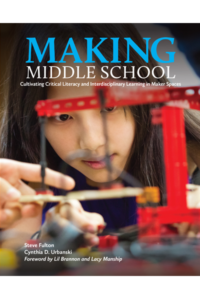Author: Steve Fulton and Cynthia D. Urbanski
Summary: In this excerpt from Making Middle School: Cultivating Critical Literacy and Interdisciplinary Learning in Maker Spaces, Steve Fulton and Cynthia D. Urbanski draw a connection between Freire’s understanding of emancipatory education and Vygotsky’s idea of learning through play, arguing that maker education and the writing workshop offer a model for a new approach to education.
Original Date of Publication: 2020
Excerpt
In all that we have described previously, the maker approach gives students opportunities to play with, try out, or represent ideas through physically and digitally making things and then sharing drafts (iterations) in progress. Make is literacy rich, asking students and teachers to share, reflect, loop back, remake, revise, remix, and connect with others. Make brings all school subjects together by following recursive processes: launching an idea, composing, reflecting, sharing, and looping back and around. This is what writers do, and this is what scientists do. It’s also the same with historians, mathematicians, engineers, and people in general. The open-ended, iterative, and messy process that make embodies is the same one that all learners use in authentic contexts, both in jobs and in life.
Purchase Making Middle School: Cultivating Critical Literacy and Interdisciplinary Learning in Maker Spaces at NCTE.org.
